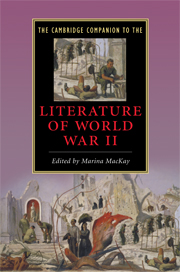14 - Theories of trauma
from Part III - Approaches and revisions
Published online by Cambridge University Press: 28 May 2009
Summary
Amid a seemingly endless proliferation of images of wounded bodies, minds, cities, and states, today we might be forgiven for forgetting that the connection between war and trauma was forged only relatively recently. This is not to say that the Trojans didn't have their minds shattered by years of siege, or that the descendants of the Languedoc heretics didn't suffer with the memories of the burning bodies of their distant relatives. But the sense that war traumatizes, that it forces a crisis in what it means either to have a mind or to be able to remember what has happened in any straightforward way at all, is modern. For psychoanalysis, trauma is what happens when thinking fails or can no longer take place. It is modern, because the experience of modernity makes thinking about and experiencing the world harder even as technology has supposedly made things easier. Modern war, the marriage of technology with barbarism as it was thought of by many in the middle of the twentieth century, has become the highly charged emblem of a moral, psychological, and existential paralysis of thought. “The mind ought to find a way out, but the mind has lost all capacity to so much as look outward,” the philosopher Simone Weil wrote of the experience of being inside a war. She was writing about Homer's war epic, and the model for all war stories to come, The Iliad. But the entrapment of which Weil writes so pressingly, the sense of being in the vice-like grip of an experience so intense that one cannot even think it, speaks directly to the year (1940) in which Weil was writing, and to her exile from a newly and devastatingly fallen France. The Second World War, perhaps more than any war before it, raises the question of how war can be held in the mind when the mind itself is under siege; of what it means to experience a trauma so unrelentingly forceful (Weil's essay is called “The Iliad, or the Poem of Force”), that it cannot be grasped consciously.
- Type
- Chapter
- Information
- The Cambridge Companion to the Literature of World War II , pp. 194 - 206Publisher: Cambridge University PressPrint publication year: 2009
- 3
- Cited by

